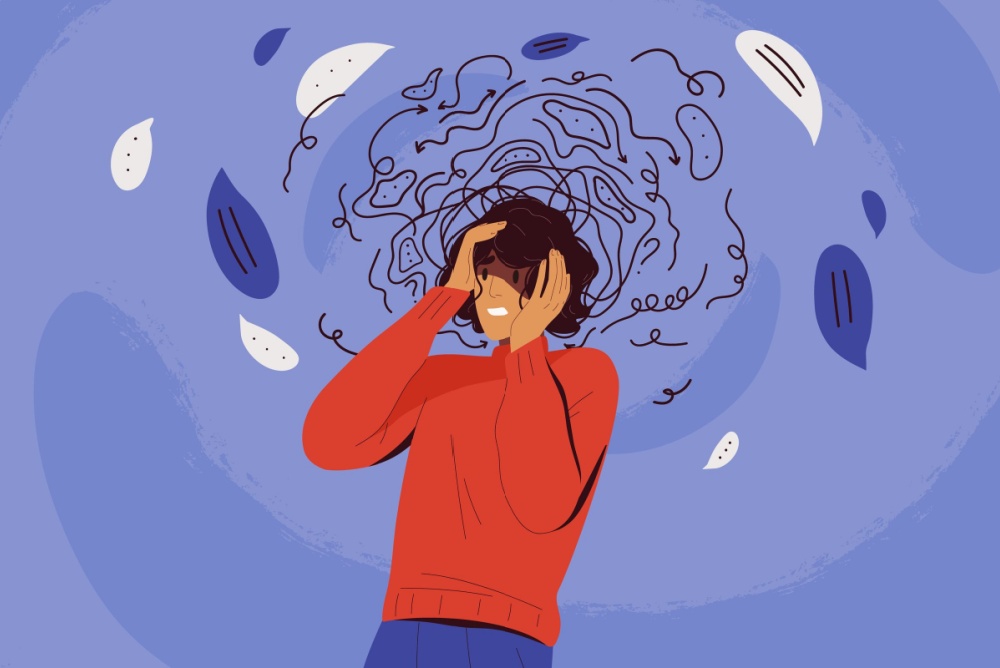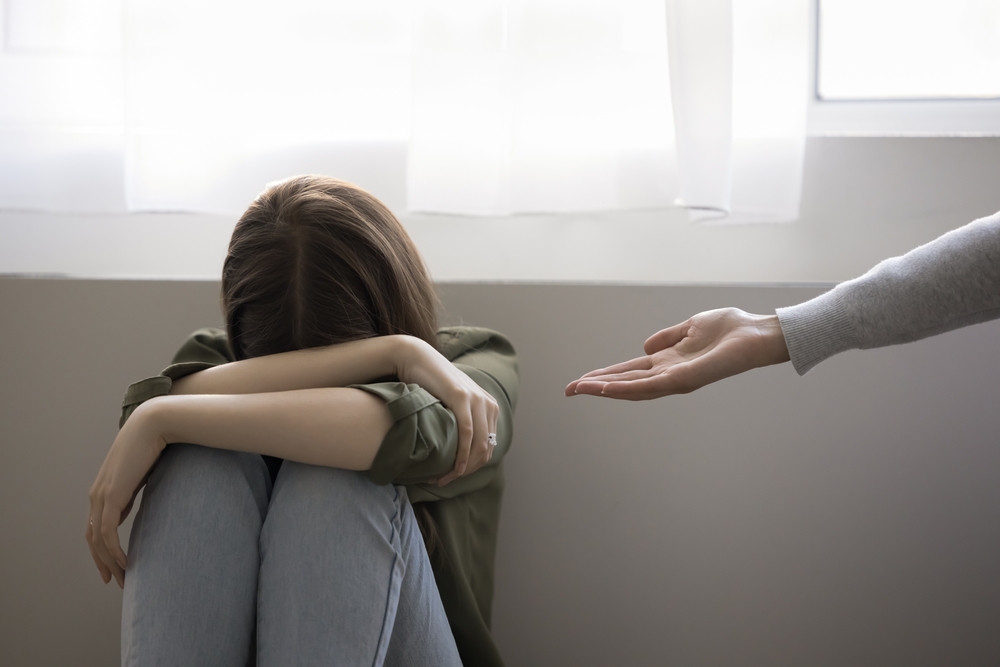Anxiety and sleep apnea are a tough combination. Both conditions can make you feel exhausted and overwhelmed. You may find it hard to fall asleep, stay asleep, or feel rested in the morning. The constant worry and tension from anxiety can worsen sleep apnea, leading to more breathing interruptions at night.
This cycle of poor sleep and increased anxiety can leave you feeling frustrated and hopeless. Understanding how these two conditions interact is key to finding relief.
Did you know that 20% of adults in America have anxiety, and 22 million suffer from sleep apnea? Research shows these conditions could be closely related, with 71% of sleep apnea patients experiencing anxiety. This cycle can feel overwhelming, but there is hope.
Dr. Carla Yamashiro at Ecologic Dentistry is dedicated to identifying and treating airway related issues, ensuring a good night’s sleep. Addressing your airway can also reduce anxiety symptoms, leading to a better quality of life. By understanding and treating both conditions, you can improve your overall well-being.
Can Sleep Apnea Cause Anxiety?
Sleep apnea involves pauses in breathing during sleep. These pauses often occur at night, leading to poor sleep and daytime tiredness. Anxiety, on the other hand, is a condition where an individual is excessively worried about situations or events. Though these conditions seem unrelated, evidence suggests a potential link between them.
Untreated sleep apnea leads to chronic sleep deprivation, causing the body to undergo changes that can enhance anxiety symptoms such as restlessness and irritability. Sleep deprivation affects the mind’s rhythms, which can be devastating for those who need rest. This lack of rest can lead to increased stress.
The relationship between sleep apnea and anxiety is complex. Sleep apnea can increase stress levels, while anxiety can worsen sleep apnea symptoms. Addressing both conditions is crucial for improving overall health and quality of life. Understanding this connection helps manage and treat both conditions effectively.
What Is Anxiety?
Anxiety is a common emotional response characterized by feelings of worry, nervousness, or fear. It often occurs in response to stress or uncertainty. People with anxiety may experience a range of symptoms, including a racing heart, sweating, and difficulty concentrating.
Anxiety can affect daily life, making it hard to perform tasks or interact with others. Understanding anxiety is crucial for managing it effectively and improving overall well-being.
Symptoms of Anxiety
- Excessive worrying about everyday situations
- Feeling restless or on edge
- Difficulty concentrating or focusing
- Irritability and agitation
- Sleep disturbances, such as insomnia
- Muscle tension and headaches
- Panic attacks, marked by intense fear and physical symptoms like shortness of breath and chest pain
How Anxiety Affects Sleep
Anxiety can seriously disrupt sleep patterns, making it hard to fall or stay asleep. When consumed with worry, your mind races, making relaxation difficult. This often leads to trouble falling asleep and frequent awakenings throughout the night. You wake up feeling exhausted and frustrated, struggling to get through the day.
Anxiety’s grip on your sleep affects your mood, energy levels, and overall quality of life. The relentless cycle of poor sleep and increased stress can seem never-ending, impacting your daily routines and relationships.
Here are some ways that anxiety can disturb sleep:
- Trouble Falling Asleep: Anxiety makes it hard to calm your mind, often taking hours to fall asleep.
- Interrupted or Short Sleep: Anxiety causes frequent wake-ups during the night, accompanied by racing thoughts and heightened alertness.
- Sleep Fragmentation: Anxiety leads to fragmented sleep, leaving you feeling exhausted and unrefreshed.
- Dream Disturbances: Anxiety causes more vivid and intense dreams, leading to unsettled and anxious feelings.
- Sleep Disorders: Chronic anxiety increases the risk of developing sleep problems like insomnia, restless leg syndrome, and untreated sleep apnea.
To control anxiety’s impact on sleep, it’s crucial to reduce anxiety through interventions like relaxation techniques and Butekyo breathing re-education. Dr. Yamashiro is dedicated to identifying and treating airway problems for optimal sleep.
This approach not only enhances sleep quality and duration but also addresses one of the possible root causes of anxiety. By managing anxiety and treating sleep related issues, you can improve overall well-being and achieve better, more restful sleep.
What is Sleep Apnea?
Sleep apnea is a common but serious sleep disorder where your breathing repeatedly stops and starts during sleep. These pauses can last from a few seconds to a minute and may occur 30 times or more per hour. This disruption in breathing can lead to poor sleep quality, leaving you feeling tired and irritable during the day. Understanding sleep apnea is crucial, as it affects your overall health and well-being.
Symptoms of Sleep Apnea
Some symptoms of sleep apnea include?
- Loud snoring
- Daytime sleepiness
- Morning headaches
- Fatigue and poor concentration
- Mood changes
How Sleep Apnea Is Connected to Anxiety
Sleep apnea and anxiety are closely linked, creating a cycle that affects overall well-being. When you experience sleep apnea, your breathing repeatedly stops and starts during sleep, causing fragmented and poor-quality rest. This lack of restful sleep increases stress and anxiety levels.
On the other hand, anxiety can exacerbate sleep apnea by increasing muscle tension and disrupting normal breathing patterns. This cycle can lead to daytime fatigue, irritability, and heightened anxiety, further impacting your daily life and health. Recognizing and treating both conditions is crucial for improving sleep quality and reducing anxiety.

Influence of Sleep Apnea on Anxiety
Sleep apnea significantly impacts anxiety levels, often creating a challenging cycle. Here’s how sleep apnea influences anxiety:
- Poor Sleep Quality: Frequent pauses in breathing disrupt deep sleep, leading to chronic fatigue and increased anxiety.
- Oxygen Deprivation: The lack of oxygen during apnea episodes triggers stress hormones, raising heart rates and causing a sense of unease.
- Increased Stress: Constant physical strain and fragmented sleep heighten stress and make managing anxiety difficult.
- Daytime Fatigue: Ongoing tiredness affects mood and cognitive function, exacerbating anxiety symptoms.
Recognizing and treating sleep apnea can break this cycle, reducing anxiety and improving overall well-being. Proper diagnosis and treatment are essential for better mental and physical health. By addressing both conditions simultaneously, you can achieve more restful sleep and a calmer mind.
Impact of Anxiety on Sleep Apnea
Anxiety significantly affects sleep apnea, creating a vicious cycle that worsens both conditions. Here’s how anxiety influences sleep apnea:
- Disrupted Sleep Patterns: Anxiety makes it hard to fall asleep and stay asleep, leading to more frequent apnea episodes.
- Increased Muscle Tension: Anxiety causes muscle tension, including in the throat and jaw, which can narrow airways and exacerbate sleep apnea.
- Heightened Arousal: Anxiety increases overall arousal and alertness, making it difficult to relax and maintain steady breathing during sleep.
- Stress Hormones: Anxiety triggers the release of stress hormones, which can worsen the frequency and severity of apnea episodes.
Managing anxiety can help improve sleep apnea symptoms, leading to better overall health and quality of life. Addressing both conditions together is crucial for achieving restful sleep and a calmer mind.
Treatments for Anxiety
Managing anxiety effectively requires a comprehensive approach by a trained professional. Here are some common treatments:
- Butekyo Breathing Technique: Re-educates and changes disruptive breathing patterns.
- Cognitive Behavioral Therapy (CBT): CBT helps identify and change negative thought patterns and behaviors.
- Medication: Anti-anxiety medications, such as SSRIs, can be prescribed to help manage symptoms.
- Mindfulness and Relaxation Techniques: Practices like meditation, yoga, and deep breathing exercises can reduce stress and anxiety.
- Lifestyle Changes: Regular exercise, a healthy diet, and sufficient sleep can improve overall mental health.
The Vivos Method
The Vivos Method can be performed by a dentist, like Dr. Yamashiro, to addresses anxiety by focusing on improving airway function. The Vivos Method is a CPAP alternative that uses custom oral appliances to enhance airway function, improve breathing, and ensure restful sleep.
This method not only helps reduce anxiety but also addresses the root cause of structural related sleep issues, making it an effective and holistic treatment option.
By incorporating the Vivos Method, you can tackle anxiety and improve your overall well-being. This approach ensures better sleep and reduces anxiety symptoms, helping you lead a healthier life.
Act Now!
At Ecologic Dentistry, we understand how crucial it is to wake up feeling refreshed and full of energy. Anxiety can disrupt this by causing sleep disturbances and daytime fatigue. Often unnoticed, anxiety can lead to insomnia, fatigue, irritability, and lethargy, creating a cycle of exhaustion. Our holistic approach aims to address anxiety’s, ensuring you achieve restful sleep and better overall well-being. Let us help you break free from the cycle of anxiety and start each day feeling rejuvenated.
We believe that good sleep is essential for mental and physical health. Everyone deserves to wake up feeling refreshed each morning. Dr. Carla Yamashiro and our team at Ecologic Dentistry are dedicated to helping you achieve better sleep and overall well-being. Let us help you break the cycle and wake up refreshed.
Our Approach to Treating Sleep Apnea
- Consultation: We start by gathering detailed medical and personal information to understand the causes and patterns of your sleep apnea.
- Customized Treatment Plan: We offer various methods, including mouth appliances, Butekyo breathing techniques, and alternatives to CPAP therapy, to ensure effective treatment for better breathing and sleep.
- Continuous Support: We provide ongoing guidance to help maintain open airways and ensure you enjoy restful sleep. We’re here to support you every step of the way.
Don’t let sleep deprivation hold you back from a good night’s rest. Take the first step today by calling Dr. Carla Yamashiro’s office at (253) 863-7005 to make an appointment. Start your journey to better sleep now and schedule your free consultation today.
Schedule your free consultation today!


